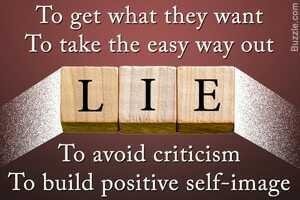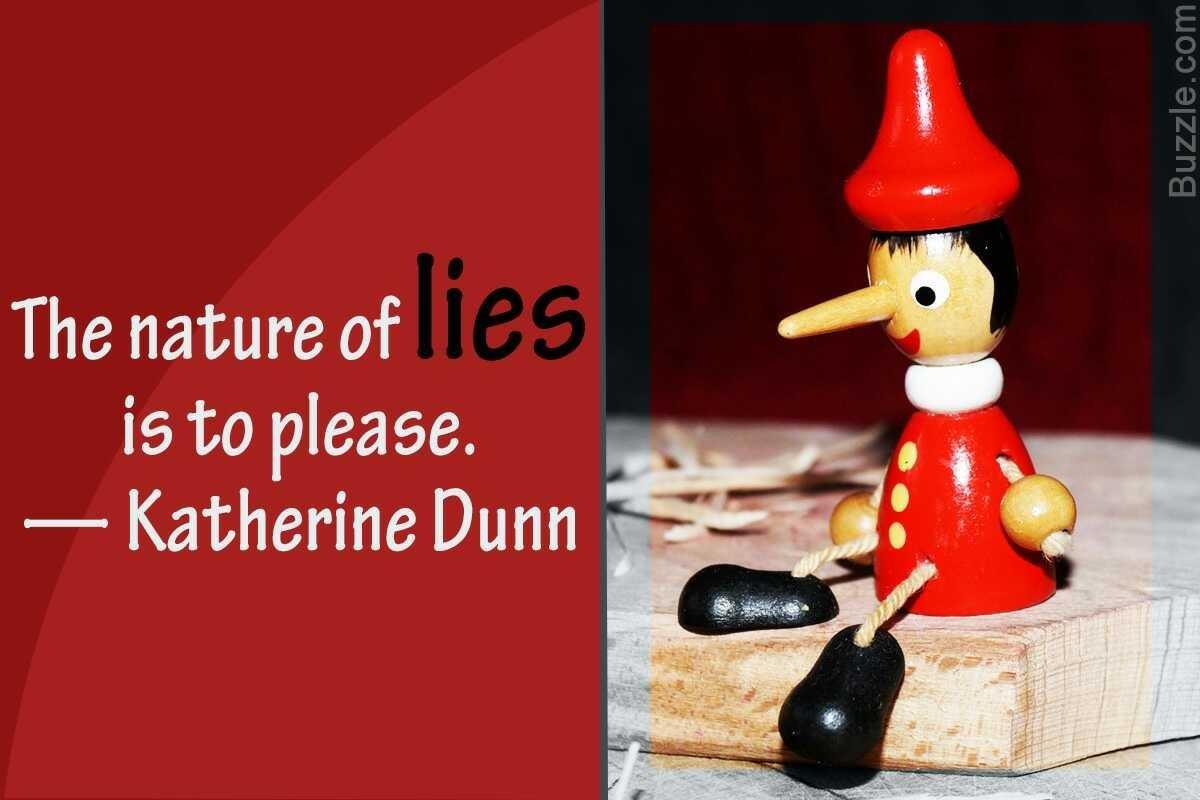Have you ever wonder why people lie? What could be the reason for them not saying to truth, to be honest, there's no straight forward answer to such question, as it is a very complex nature of human existence. At some point in each of our life's, we all lied to someone about something, we've tried to cover up the truth, we sometimes even tell ourselves that, it's safer than telling the truth, this we do so as to comfort our conscience. Is there something in our nature that encourages these self-deception? We sometimes find solace in saying it's the circumstances prevailing at that moment that compels us to lie. People lie to protect their personal interests, others are simply addicted to lying, while others lie to deceive others, and some lie to themselves to keep their sanity. Many lie to avoid criticism from others. If you are over 20, there's an 83% chance that you've lied to your parents before, and alos a 65% chance that you've lied about money before. As one grows older, there is a reduction in the rate in which a person lies, it seems ages sometimes comes with wisdom.
According to research, there are 25 different types of lies, amongst which are; polite lie, noble lie, jocose lie, bluffing, exaggeration, white lie etc. Lying is always discouraged, as it is seen as been morally wrong. Yet it's still a commonplace and it comes naturally to human beings. There are various reasons why people lie; fear being one of the most prominent ones.
Personal Reasons for Lying
The fear of punishment is an obvious reason why people lie. When a person is aware of an imminent punishment, he/she lues to escape such punishment. It's a natural reflex, and a way of humans distancing themselves from faults. This is common with children.
Another common reason why people indulge in lying is to improve their image or save face. They constantly wish to portray themselves as good, polite, successful, etc., in short, possessing all positive human qualities. Exaggeration and bluffing are two other types of lies, and methods adopted by people to impress or mislead others.
Though we all know that relationships are based on trust and truthfulness, lovers usually lie to each other or keep secrets. Misleading someone in love is an unforgivable crime; as, when found out, it can lead to distrust, misgivings and a broken relationship. Cheating on your partner by lying is a harmful way of deception. People lie in relationships to continue the goodwill and also to impress the partner. There may also be other harmful motives for deception.
Telling a lie as a joke or to fool someone is a harmless type of lie, also known as a jocose lie. Passing on information without complete knowledge is known as gossiping; but, it is also a form of lying. Sometimes, people do not want to accept the fact that they do not know the truth, and hence, they lie. This is known as 'fabrication'.
Social Reasons for Lying
So as to look agreeable, and also maintain good relations, people tend to lie in our society. These are what we call white lies. People tend to lie more when in company. In such a situation, there is no difference between a man lying or a woman lying.
People lie in order to protect privacy about oneself as well as others and also to maintain self-worth and self-esteem. Lying is not considered harmful and deceptive if someone lies to refrain from hurting others' feelings.
'Lying by omission' is, nowadays, considered a part and parcel of business, when a salesman purposefully creates a misconception by omitting certain facts. In business, one may need to lie in order to maintain good relations or even to sell products. Lying for a deceptive gain is considered a harmful type of lying.
When a doctor refrains from telling the truth about his patients' health to avoid affright among his family; or a policeman lying in order to avoid panic it is called a noble lie.
Compulsive Lying
- Compulsive lying is a disorder (Mendacity is the word used to describe an inclination to lying). Compulsive liars are known as chronic liars, these people have acquire a habit of lying and tend to lie in any and every situation. Lying comes naturally to them and they find it almost difficult to tell the truth. Compulsive lying is a disorder that develops from early adolescence. One must keep an eye out for signs of compulsive lying.
It should also be noted that chronic liars mean no harm and most of the time they do it unintentionally. Compulsive lying results in broken relationships at every level. Compulsive lying can also be an underlying symptom of some other serious disorder and one has to be treated as soon as possible.
How to stop lying
When an illness as been discovered, the solution is not far off. So if you find out that your lues aren't noble or are frequent then you should do the following.
➡ Build up your confidence level. Lying is a show of lack of confidence, especially when it's for social reasons. Confidence is built through self motivation, and other inspirational methods.
➡ An applicable method of effectively helping someone who lies a lit is by explaining to them the consequences of lying. This is usually used as a corrective methods for children and teenagers.
➡ When a person is suffering from compulsive lying, this person needs to admit this disorder, and also admit that he/she needs help. Self-hypnosis and counseling are some of the effective methods to stop compulsive lying.
➡ Last, but not the least, you need to make the person understand that confessing and apologizing, although seemingly difficult, is an effective way of getting over lying and re-building your image and self-respect.
If you find a near and dear one lying frequently, you can try to understand the underlying cause for it. You can help the person before it becomes habitual for him/ her and leads to serious consequences.
Thanks for reading, take care!
I'm @daniel-otaniel, reminding you that when God thought of greatness, he created you to show for it.




